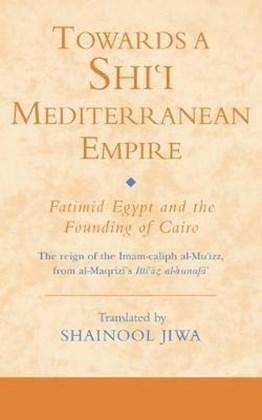Towards a Shiʿi Mediterranean Empire Fatimid Egypt and the Founding of Cairo: The reign of the Imam-caliph al-Muʿizz from al-Maqrīzī's Ittiʿāẓ al-ḥunafāʾ
I.B. Tauris in association with the Institute of Ismaili Studies
The Imam-caliph al-Muʿizz li-Dīn Allāh (r. 953–975), founder of the city of Cairo, transformed the emergent Fatimid state from a regional power of limited influence to an impressive Mediterranean empire whose authority extended from the shores of the Atlantic to the Indian Ocean. His vision and dynamism contributed to the high watermark of Fatimid success in establishing a Shiʿi empire, which contributed to the cultural and intellectual efflorescence of the Muslim world. Amongst al-Muʿizz’s crowning achievements was the conquest of Egypt, a cherished goal of the Fatimids, which they subsequently governed for over two centuries. The writings of the erudite 15th-century Mamluk scholar Taqī al-Dīn al-Maqrīzī, document this Fatimid triumph and provide one of the most comprehensive accounts of al-Muʿizz's reign. Al-Maqrīzī’s Ittiʿāz al-ḥunafāʾ bi-akhbār al-āʾimma al-Faṭimiyyīn al-khulafā is an invaluable text on the Fatimid era, compiled from a range of sources, many of which are no longer extant.
In this text, the only complete history of the Fatimids written by a medieval Sunni historian, al-Maqrīzī demonstrates a critical discernment regarding the value and limitations of his sources that is unusual amongst Muslim historians of the time. Moreover, he records a number of official documents, letters and sermons in their entirety, often making his writings the only surviving source for this material. The English translation of a section of this rare work, presented here for the first time, together with a comprehensive introduction and annotations, makes a notable contribution to one of the most fascinating periods in Islamic history.
Acknowledgements
Chronology
Map
INTRODUCTION
The Fatimids
Origins of the Fatimids. The Fatimids in North Africa.
Al-Muʿizz li-Dīn Allāh
The accession of al-Muʿizz. Egypt and the founding of Cairo. Al-Muʿizz and the Qarāmiṭa. Accomplishments of al-Muʿizz. Al-Maqrīzī’s portrayal of al-Muʿizz.
Al-Maqrīzī and the Fatimids
Al-Maqrīzī and the Ahl al-Bayt. Al-Maqrīzī’s scholarship on the Fatimids. A paradoxical Fatimid scion? The Khaldunian protégé.
Note on the Translation
TRANSLATION OF THE TEXT FROM THE ITTIʿĀZ AL-ḤUNAFĀʾ
Establishing the Imamate of Al-Muʿizz
Jawhar’s campaign in the Maghrib. Circumcision of the Princes. Al-Muʿizz’s counsel to the Kutāma.
Preparations for the Transfer to Egypt
Jawhar’s march to Egypt. A test of Kutāma loyalty. Al-Muʿizz’s advice to Jawhar. Appointment of a viceroy in the Maghrib. Al-Muʿizz exhorts the Kutāma. Al-Muʿizz’s departure for Egypt. Episode of the two Slavs. Resolution of a Ḥasanī-Jaʿfarī feud in the Hijaz.
Fatimid Administration and the Building of Cairo
Proclamation of the amān. Revolt of the Ikshīdiyya and Kāfūriyya. Jawhar’s arrival in Fustat. The foundation of Cairo. Jawhar’s first year in Egypt.
Then Began the Year 359 [969–970]
Jawhar’s administration of Egypt. The Fatimid invasion of Syria.
Then Began the Year 360 [970–971]
More on Jawhar’s administration. Qarāmiṭa incursion into Egypt.
Then Began the Year 361 [971–972]
The Qarāmiṭa besiege Cairo.
Then Began the Year 362 [972–973]
More on Jawhar’s administration. Al-Muʿizz’s departure for Egypt.
The Arrival of Al-Muʿizz in Egypt
Al-Muʿizz leads ‘īd prayer in Cairo. Inauguration of the Nile Canal. Display of the Fatimid shamsa. Celebration of ʿĪd al-Ghadīr.
Then Began the Year 363 [973–974]
The collection of land-tax. Audiences with al-Muʿizz.
An Account of Some News on the Qarāmiṭa
The conversion of Hamdān Qarmaṭ. The Qarmaṭī leader ʿAbdān. The Qarmaṭī leader Abū Saʿīd al-Jannābī. Abbasid attempts to curb the Qarāmiṭa.
Al-Ṣanādiqī [Ibn Hawshab]
The Ismaili-Qarāmiṭa split. TheQarmaṭī leaders Zikrawayh and al-Ḥasan b. Zikrawayh. The Qarmaṭī leader Abu Tahir al-Jannabi. The Qarāmiṭa in Iran. Fatimid forces battle the Qarāmiṭa in Syria. Al-Muʿizz’s letter to the Qarāmiṭa. Defeat of the Qarāmiṭa in Egypt. The Qarāmiṭa defeat in Syria. The Qarāmiṭa defeat in Iraq.
The Final Phase of Al-Muʿizz’s Reign
Turmoil in Damascus.
Then Began the Year 364 [974–975]
Demise of Prince ʿAbd Allāh b. al-Muʿizz. The rise of Aftakin in Syria. The year of the comet. The final year of al-Muʿizz’s reign. The demise of al-Muʿizz.
Bibliography
Index
Shainool Jiwa is a specialist in the Fatimid era and Head of the Department of Community Relations at The Institute of Ismaili Studies, London. She holds degrees from McGill University and the University of Edinburgh, and is the author of several papers and articles in the field of medieval Islamic history.

